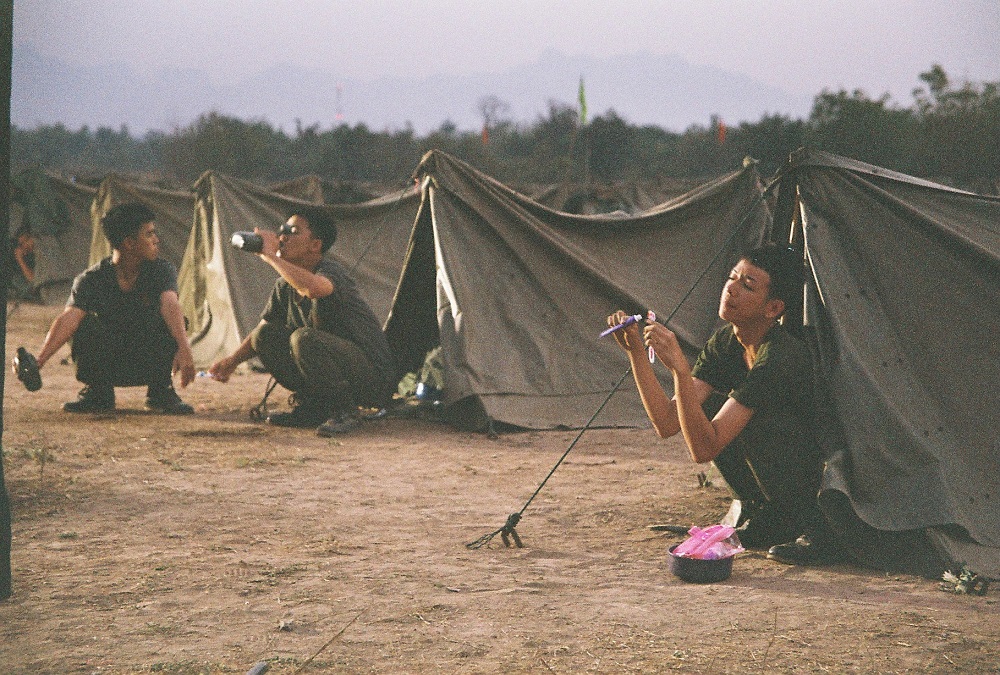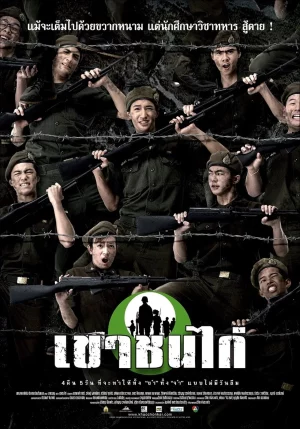KUBHD ดูหนังออนไลน์ Khao Chon Kai (2006) เต็มเรื่อง เขาชนไก่ เขาชนไก่ เป็นชื่อค่ายฝึกทหารสำหรับเด็กชายมัธยมปลายในประเทศไทย เด็กชายไทยส่วนใหญ่ที่สมัครเข้าเรียนจะใช้เวลาปีสุดท้ายในเขาช่องไก่เพื่อรับการฝึกอบรมและเรียนรู้เทคนิคทางทหาร ภาพยนตร์เรื่องนี้มุ่งเน้นไปที่กลุ่มเด็กผู้ชายที่พบกันที่ค่ายและเริ่มฝึกด้วยกัน อุปสรรคมากมายเกิดขึ้นระหว่างการฝึกฝนอย่างหนักที่พวกเขาต้องเผชิญ ต่อมา มิตรภาพและมิตรแท้เป็นสิ่งล้ำค่าที่สุดที่พวกเขาพบในเขาชนไก่

KUBHD ดูหนังออนไลน์ Khao Chon Kai (2006) เต็มเรื่อง
ข้าวชนไก่” (2549) กลายเป็นบทกวีภาพยนตร์ที่แสดงถึงเอกลักษณ์ทางวัฒนธรรม โดยผสมผสานสายใยแห่งประเพณี ชุมชน และมรดกเข้าด้วยกันในผืนผ้าอันอุดมสมบูรณ์ของวัฒนธรรมไทย โดยมีฉากหลังเป็นหมู่บ้านเล็กๆ ท่ามกลางภูมิประเทศอันเขียวชอุ่มของประเทศไทย ภาพยนตร์เรื่องนี้เจาะลึกชีวิตของผู้อยู่อาศัยในขณะที่พวกเขาต่อสู้กับความท้าทายในการรักษามรดกทางวัฒนธรรมของตนเมื่อเผชิญกับความทันสมัยและโลกาภิวัตน์
โดยหัวใจหลักคือ “ข้าวชนไก่” ทำหน้าที่เป็นการเฉลิมฉลองวัฒนธรรมไทยและประเพณีอันยาวนานที่สืบทอดกันมาจากรุ่นสู่รุ่น ภาพยนตร์เรื่องนี้นำเสนอชีวิตในหมู่บ้านอย่างแท้จริงให้ผู้ชมได้สัมผัสถึงผ้าผืนที่มีชีวิตชีวาของขนบธรรมเนียม พิธีกรรม และความเชื่อของไทยที่กำหนดแก่นแท้ของชุมชน KUBHD ดูหนังออนไลน์ Khao Chon Kai (2006) เต็มเรื่อง
ชื่อตัวเองว่า “เขาชนไก่” มีความหมายเชิงสัญลักษณ์ โดยหมายถึงพิธีไทยแบบดั้งเดิมที่ชาวบ้านรวมตัวกันเพื่อทำบุญและขอพรแก่ดวงวิญญาณของบรรพบุรุษของพวกเขา ด้วยพิธีกรรมนี้ ชาวบ้านจะให้เกียรติมรดกทางวัฒนธรรมของตน และยืนยันอีกครั้งถึงความเชื่อมโยงกับผืนดินและประเพณีที่สืบทอดกันมาหลายศตวรรษ
นอกจากนี้ “เขาชนไก่” ยังเจาะลึกถึงความซับซ้อนของอัตลักษณ์ทางวัฒนธรรมและความท้าทายในการอนุรักษ์ประเพณีในโลกที่เปลี่ยนแปลงตลอดเวลา ในขณะที่หมู่บ้านต้องต่อสู้กับแรงกดดันของความทันสมัยและการพัฒนาเศรษฐกิจ ผู้อยู่อาศัยถูกบังคับให้เผชิญหน้ากับความเป็นจริงของโลกาภิวัตน์และการพังทลายของมรดกทางวัฒนธรรมของพวกเขา Khao Chon Kai
ผ่านเลนส์ตัวละคร “เขาชนไก่” สำรวจความตึงเครียดระหว่างประเพณีและความก้าวหน้า เน้นการต่อสู้เพื่อสร้างสมดุลระหว่างการรักษาเอกลักษณ์ทางวัฒนธรรมกับความต้องการของสังคมที่เปลี่ยนแปลงอย่างรวดเร็ว ในขณะที่คนรุ่นใหม่แสวงหาโอกาสที่อยู่เหนือขอบเขตของหมู่บ้าน พวกเขาก็ขาดระหว่างความปรารถนาที่จะมีอนาคตที่ดีกว่ากับความรับผิดชอบในการสืบสานประเพณีของบรรพบุรุษ
นอกจากนี้ ภาพยนตร์เรื่องนี้ยังเจาะลึกถึงความสำคัญของชุมชนและความผูกพันที่ทำให้ผู้อยู่อาศัยเป็นน้ำหนึ่งใจเดียวกันในช่วงเวลาแห่งความทุกข์ยาก ในขณะที่ชาวบ้านมารวมตัวกันเพื่อเฉลิมฉลองมรดกทางวัฒนธรรมของตน และเผชิญกับความท้าทายที่วิถีชีวิตของพวกเขาเผชิญอยู่ พวกเขาก็ค้นพบความเข้มแข็งและความยืดหยุ่นที่มาจากความสามัคคีและความสามัคคี kubhd
นอกจากการสำรวจเอกลักษณ์ทางวัฒนธรรมแล้ว “เขาชนไก่” ยังทำหน้าที่เป็นจดหมายรักถึงความงามของภูมิทัศน์ธรรมชาติของประเทศไทยและจังหวะของชีวิตในชนบท ภาพยนตร์เรื่องนี้นำพาผู้ชมไปสู่โลกแห่งป่าอันเขียวชอุ่ม นาข้าวเขียวขจี และแม่น้ำที่ส่องประกายระยิบระยับ เชิญชวนให้พวกเขาดื่มด่ำไปกับภาพและเสียงของชนบทไทยผ่านการถ่ายทำภาพยนตร์ที่น่าทึ่งและการเล่าเรื่องที่เร้าใจ
แม้จะสำรวจประเพณีและอัตลักษณ์ทางวัฒนธรรม แต่ในที่สุด “เขาชนไก่” ก็สื่อถึงความหวังและการฟื้นฟู เตือนใจผู้ชมว่าจิตวิญญาณของชุมชนไม่สามารถดับได้ด้วยสายลมแห่งการเปลี่ยนแปลง ภาพยนตร์เรื่องนี้เชิญชวนผู้ชมให้สัมผัสถึงความงดงามและความอุดมสมบูรณ์ของมรดกทางวัฒนธรรมของตนเองผ่านการถ่ายทอดชีวิตในหมู่บ้านอย่างแท้จริงและการเฉลิมฉลองวัฒนธรรมไทย
โดยสรุป “เขาชนไก่” (2549) ถือเป็นเครื่องพิสูจน์ถึงพลังแห่งประเพณีที่ยั่งยืนและความสำคัญของการอนุรักษ์มรดกทางวัฒนธรรมในโลกที่เปลี่ยนแปลงตลอดเวลา ภาพยนตร์เรื่องนี้เชิญชวนให้ผู้ชมสะท้อนถึงอัตลักษณ์ทางวัฒนธรรมของตนเองและชื่นชมประเพณีที่เชื่อมโยงพวกเขากับอดีต ปัจจุบัน และอนาคตผ่านการถ่ายทอดชีวิตหมู่บ้านไทยอย่างแท้จริงและการเฉลิมฉลองของชุมชนและประเพณี

Khao Chon Kai (2006) เขาชนไก่
“Khao Chon Kai” (2006) emerges as a cinematic ode to cultural identity, weaving together the threads of tradition, community, and heritage in the rich tapestry of Thai culture. Set against the backdrop of a small village nestled amidst the lush landscapes of Thailand, the film delves into the lives of its inhabitants as they grapple with the challenges of preserving their cultural heritage in the face of modernization and globalization.
At its core, “Khao Chon Kai” serves as a celebration of Thai culture and the timeless traditions that have been passed down through generations. Through its authentic portrayal of village life, the film offers audiences a glimpse into the vibrant tapestry of Thai customs, rituals, and beliefs that define the essence of the community.
The title itself, “Khao Chon Kai,” holds symbolic significance, referring to a traditional Thai ceremony in which villagers gather to make merit and offer blessings to the spirits of their ancestors. Through this ritual, the villagers honor their cultural heritage and reaffirm their connection to the land and the traditions that have sustained them for centuries.
Moreover, “Khao Chon Kai” delves into the complexities of cultural identity and the challenges of preserving tradition in an ever-changing world. As the village grapples with the pressures of modernization and economic development, the inhabitants are forced to confront the realities of globalization and the erosion of their cultural heritage.
Through the lens of its characters, “Khao Chon Kai” explores the tension between tradition and progress, highlighting the struggle to balance the preservation of cultural identity with the demands of a rapidly changing society. As the younger generation seeks opportunities beyond the confines of the village, they are torn between their desire for a better future and their responsibility to uphold the traditions of their ancestors.
Furthermore, the film delves into the importance of community and the bonds that unite its inhabitants in times of adversity. As the villagers come together to celebrate their cultural heritage and confront the challenges facing their way of life, they discover the strength and resilience that comes from unity and solidarity.

In addition to its exploration of cultural identity, “Khao Chon Kai” serves as a love letter to the beauty of Thailand’s natural landscapes and the rhythms of rural life. Through its breathtaking cinematography and evocative storytelling, the film transports audiences to a world of lush forests, verdant rice paddies, and shimmering rivers, inviting them to immerse themselves in the sights and sounds of the Thai countryside.
Despite its exploration of tradition and cultural identity, “Khao Chon Kai” ultimately offers a message of hope and resilience, reminding audiences that the spirit of a community cannot be extinguished by the winds of change. Through its authentic portrayal of village life and its celebration of Thai culture, the film invites audiences to embrace the beauty and richness of their own cultural heritage.
In conclusion, “Khao Chon Kai” (2006) stands as a poignant testament to the enduring power of tradition and the importance of preserving cultural heritage in an ever-changing world. Through its authentic portrayal of Thai village life and its celebration of community and tradition, the film invites audiences to reflect on their own cultural identities and to cherish the traditions that connect them to their past, present, and future.




































7.5